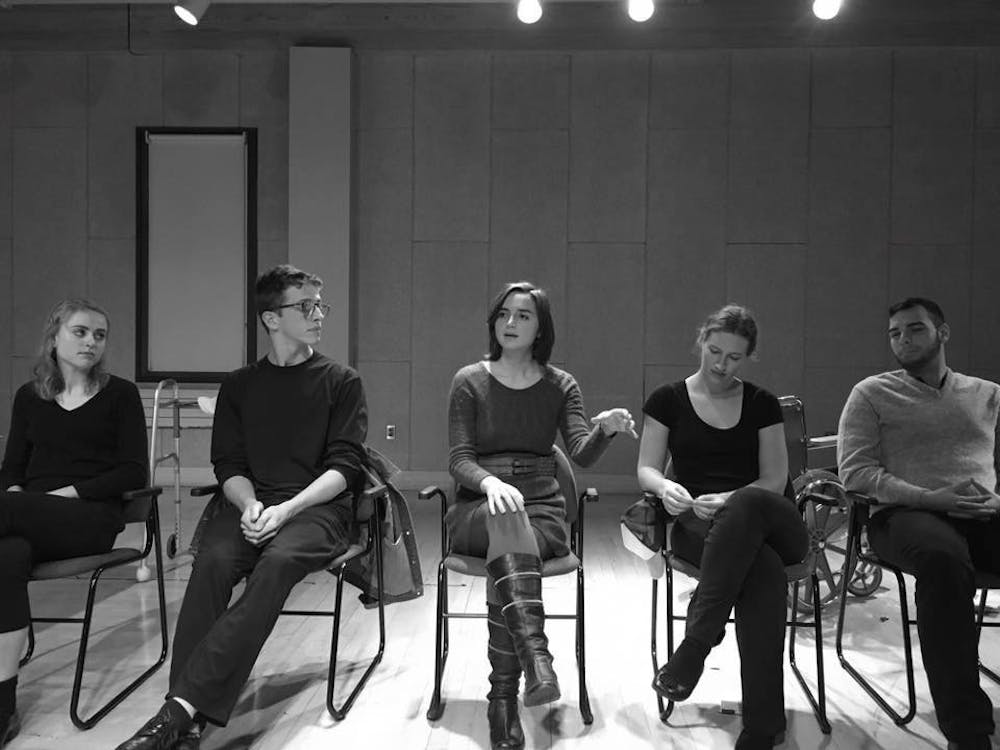It is not often that we, as college students, venture outside the college bubble. Sometimes it is easy to forget that not everyone is a teenager or a twenty-something, and that there are people living in Middlebury who are not students or teachers at the College. However, when we do find ourselves exploring the town and beyond, we are awakened and inspired by the experiences that those in the outer community have to share.
Celia Watson ’17 brought the stories of elders in the Middlebury community to life in her senior independent work, “Old Enough to Know Better, Young Enough to Do It Again.” In this piece, Watson created an intriguing and stunning picture of senior life, as told by the elderly residents of Project Independence in Middlebury. Project Independence, a branch of Elderly Service in town, serves as a day center for elderly people who need supervision, and provides a wealth of services for seniors throughout Addison County.
The play, which was written, devised and produced by Watson, was transcribed almost completely verbatim from interviews with members of Project Independence. It was performed on Dec. 2 and 3 at Project Independence and at the College on Dec. 4. There was a question and answer session after the performance, which gave the audience the opportunity to learn about the process that Watson and the actors went through to get the final product. The work featured actors Lucie Heerman ’19, Will Kelley ’19.5, Steven Medina ’17 and Gabrielle Owens ’17, as well as sound operator Alex Williamson ’17.
“When I first began discussing this project with Theatre faculty, we talked about a number of different organizations in town that were centered around a specific social issue or population,” Watson said. “I am good friends with Jack DesBois ’15.5 who works full-time at Project Independence, and when I talked about my idea to do a verbatim piece, he was supportive and helped set up introductions with the staff there. I had heard and read about devised plays featuring the elderly population (often associated with ‘Reminiscence theatre’) and I thought this group would bring a variety of topics to explore. There is also something profound about theatrically exploring aging, as it is a process that happens to all of us and also isn’t frequently talked about in our culture.”
According to Owens, who played Mary, Dorothy and Diane, sharing and relating the elders’ stories to a broader audience was one of the project’s goals.
“Elders are too often forgotten and shoved aside, hidden away in nursing homes or care centers, in modern American society, while the stories and wisdom they have to share with us remain immensely valuable,” she stated. “I think what we were all working towards in this production was a greater understanding, both for ourselves and for our audience, of what it means to age — what is lost, but also what is gained.”
The stories touched upon the lives and traumatic experiences of the interviewees. One story depicted the condition of Parkinson’s; another told of the death of a spouse; another, a first date at the drive-in movies. Since the interviews were recounted and acted verbatim, the actors worked with the unique oratory habits of each interviewee. This attested to the impressive acting chops of the performers, who used voices and physicality to retell the stories of the elders.
“The process of doing a verbatim show is different because it was a new way of approaching my character,” said Medina, who played Pedro. “It felt as though I relied less on analyzing a text, and more on feeling what it is like to be a human, and because Pedro was such a great guy, what it means to be a wonderful person who has come such a long way.”
The recordings from the interviews with the elders were essential in Medina’s portrayal of Pedro.
“Being that Pedro had a stroke and spoke English as a second language, there were some noticeable differences in his speech pattern. Learning this would be hard if I did not have both the vocal recordings and written script. The vocal recording allowed me to understand what he actually said because I was able to listen and interpret his speech, which allowed me to ‘feel’ like Pedro.”
“Working with verbatim text brings a lot of character, humanity and originality to dialogue that is often hard to convey through fictional speech,” affirmed Watson. “However it does pose many challenges, in that if you want to stay true to the person’s words, you perform them word for word, even if it flows less smoothly than typical theatre speech.”
Throughout the night, the various stories recounted on the stage created lifelike portrayals of the people from the center. The stories told of heartbreak and loss, of mental and physical atrophy, of youth and aging. As a whole, the stories showed sides of the community that can be lost in the on-campus bubble, reminding the audience that there are people outside the College who have experiences to share.
“I found that the elderly really appreciate one-on-one conversation and interest in their lives and stories,” Watson said. “Some of the most gratifying moments were actually having the interviews themselves, being off-campus for a bit and having coffee with them at the breakfast table.”
According to the cast, the interviewees received the performance very well.
“As a performer, I have rarely felt that I had such a strong and immediately evident impact on an audience as I did at Project Independence,” Owens said. “I saw several of the interviewees crying or on the verge of tears during the performance. Most notably for me personally, the real life version of ‘Diane,’ who was the character in the jean jacket, was sitting right in front of me while I delivered her monologue and she started crying about midway through. After I finished her monologue, she called out, ‘Thank you.’”




